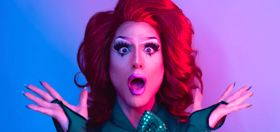
Multiplayer battle game League of Legends hit a representation milestone this week, launching their first ever LGBTQ+ Black hero. This character was also their first to be marketed openly as queer from the get-go — in some regions, that is.
K’Sante, the game’s newest champion, was announced to be queer by his voice actor last month with the release of his teaser trailer.
The trailer is officially titled “The Hunter’s Pride”:
I’m excited to give life and voice to K’Sante and make history portraying the first LGBTQ black Champion Warrior @LeagueOfLegends pic.twitter.com/yCVvtZXCTe
— DeObia Oparei (@DeObia) October 13, 2022
The character is also tied to the Black queer performer of the moment, Lil Nas X. K’Sante’s release coincided with the singer’s partnership with League of Legends‘ world championship.
How about we take this to the next level?
Our newsletter is like a refreshing cocktail (or mocktail) of LGBTQ+ entertainment and pop culture, served up with a side of eye-candy.
In addition to putting out the tournament’s “STARWALKIN'” anthem, Nas helped develop K’Sante’s prestige “Empyrean” skin:
Always go all out.
Prestige Empyrean K’Sante, designed in collaboration with @LilNasX. pic.twitter.com/emW4nidvxj
— League of Legends (@LeagueOfLegends) October 18, 2022
Related: Overwatch’s new “Calling All Heroes” initiative aims to give their diversity a major buff
The hero’s queer backstory with his ex-lover and combat partner, The Archer, was explored in an animated trailer pre-release.
The two unfortunately split due to K’Sante’s ego — or, more aptly, his “pride”:
Even with all these explicitly queer elements, Riot Games has recently admitted to letting the character’s narrative be censored in certain markets.
Executive Producer Jeremy Lee spoke to Sky News about K’Sante’s release at the League Worlds event this weekend, and the details were disappointing to hear.
“Each region can localize and publish that story in what they feel like is best for the players,” Lee says.
Specifically, words like “lover” are apparently translated to more platonic words like “partner” in countries that oppose LGBTQ+ rights.
Putting it lightly, he explains that “each region may publish certain aspects of the game a little bit differently to fit into the local culture.”
Related: Gaymers name the hottest video game characters and WOOF
Global Public Relations lead Hannah Woo puts forth that players can interpret the characters how they like, even with the context altered (or stripped entirely).
“Even if it’s not explicit, even if it’s not direct, even if there are changes made, or things are just not as much in the forefront of that character’s identity, it’s like you are meant to see them.”
This isn’t the definitive gaming industry standard, though. For instance, Apex Legends‘ new trans woman character Catalyst explicitly references her transition in her trailer and hasn’t been conveniently “localized” away.
Riot Games, on the other hand, has seemingly made the conscious decision to let some translations engage in explicit queer erasure.




















SDR94103
LOL
YasherL
I see what you did there.